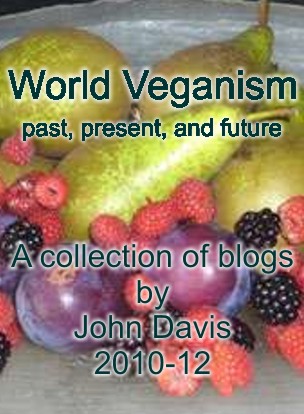April 5, 2011
 Dr. William Lambe FRCP (1765-1847)
Dr. William Lambe FRCP (1765-1847)
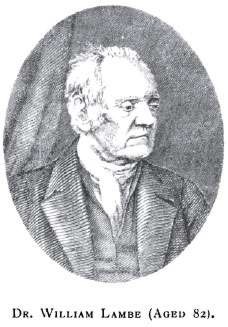 Back in 1815, in London, Dr William Lambe, Fellow of the Royal College of Physicians (FRCP), published his Water and Vegetable Diet' in which he stated: "My reason for objecting to every species of matter to be used as food, except the direct produce of the earth, is founded on the broad ground that no other matter is suited to the organs of man. This applies then with the same force to eggs, milk, cheese, and fish, as to flesh meat."
Back in 1815, in London, Dr William Lambe, Fellow of the Royal College of Physicians (FRCP), published his Water and Vegetable Diet' in which he stated: "My reason for objecting to every species of matter to be used as food, except the direct produce of the earth, is founded on the broad ground that no other matter is suited to the organs of man. This applies then with the same force to eggs, milk, cheese, and fish, as to flesh meat."
Nothing ambiguous about that! Lambe had adopted this diet himself in 1806 as a result of his own medical condition, when he was 41, and kept to it for the rest of his life. It must have worked as he lived to be 82 - a ripe old age by early 19th century standards.
He gained initial fame in 1797 by promoting the mineral waters that made a town in the English midlands into Royal Leamington Spa. He always insisted that water should be the only drink for humans.
In his later years he was able to visit the 'vegan' school at Alcott House, near London, and see his principles fully put into practice. We know that by September 1837 Dr. Lambe was exchanging letters with Sylvester Graham in America.
 Rev. Sylvester Graham (1795-1851)
Rev. Sylvester Graham (1795-1851)
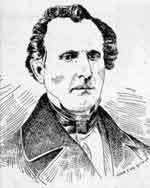 Sylvester Graham was promoting health foods in the Boston area in the 1830s, particularly brown whole-wheat bread, which became known as 'Graham bread'. His name lives on today in 'Graham crackers', though the modern version, made with white flour and sugar, is far removed from the healthy original produced by commercial companies using 'Graham flour'.
Sylvester Graham was promoting health foods in the Boston area in the 1830s, particularly brown whole-wheat bread, which became known as 'Graham bread'. His name lives on today in 'Graham crackers', though the modern version, made with white flour and sugar, is far removed from the healthy original produced by commercial companies using 'Graham flour'.
His major work was Lectures on the Science of Human Life (Boston, 1839). This had a series of numbered paragraphs, and #1291 says: "...though they do better on a milk and vegetable diet than one of flesh and vegetables, yet they do best when they confine themselves to a diet of pure vegetable food and pure water." Many of his ideas were developed from Dr. Lambe, but in the anti-British era, following the 1812-15 war, he knew he would have more success presenting them as 'all-American'.
Through most of his books, he argues against the use of eggs and dairy products, but accepts that most people will use them, so merely insists on good quality, with milk ideally 'fresh from the cow'. This was a pragmatic approach as he knew he would have little impact otherwise.
In 1849 his ^Science' was published in London by William Horsell, where it attracted a lot of interest from the larger number of British vegetarians.
 William Horsell (1807-1863)
William Horsell (1807-1863)
and Northwood Villa
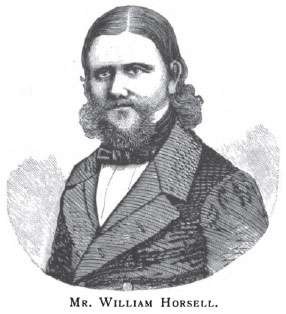 The modern Hydrotherapy revival began in Germany in the early 19th century, with the first British establishment being within Alcott House in 1842, the school near London based on Dr. Lambe's dietary principles.
The modern Hydrotherapy revival began in Germany in the early 19th century, with the first British establishment being within Alcott House in 1842, the school near London based on Dr. Lambe's dietary principles.
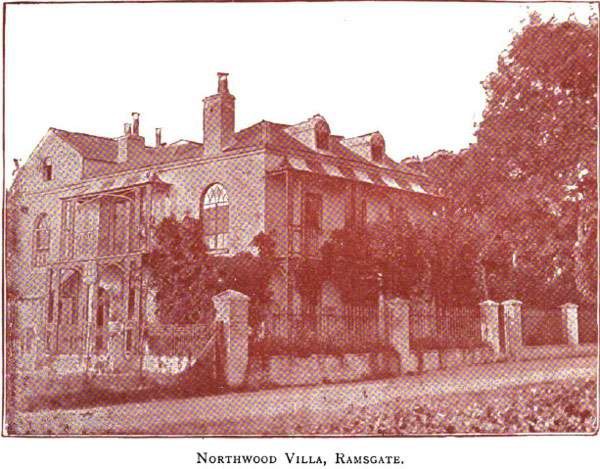 William Horsell moved that to Northwood Villa, Ramsgate, Kent at the end of 1846 - and this was the venue of the meeting which founded the world's first Vegetarian Society on September 30, 1847.
William Horsell moved that to Northwood Villa, Ramsgate, Kent at the end of 1846 - and this was the venue of the meeting which founded the world's first Vegetarian Society on September 30, 1847.
Meanwhile Horsell published 'Hydropathy for the People' in 1845 - that and the hydrotherapy institute both followed Dr. Lambe's principles, and were both what we now call vegan.
Horsell was also a London publisher, specialising in veg-related books, such as Sylvester Graham's.
In 1850 Horsell's book was published in the USA by Russell Trall.
 Russell Trall M.D. (1812-1877)
Russell Trall M.D. (1812-1877)

 In 1850 Sylvester Graham helped start the American Vegetarian Society, which lasted about 10 years. One of his co-founders, and a Vice-President was Russell Thacher Trall, a naturopathic physician who ran a hydrotherapy establishment in New York.
In 1850 Sylvester Graham helped start the American Vegetarian Society, which lasted about 10 years. One of his co-founders, and a Vice-President was Russell Thacher Trall, a naturopathic physician who ran a hydrotherapy establishment in New York.
His book of 1854 contained a lot of recipes using eggs and dairy products, but this changed in 1862. His 1874 book: 'The hygeian home cook-book; or, Healthful and palatable food without condiments' -stated that 'for a dozen years' they had left these out of the diet.
This is, so far, our first known 'vegan' cookbook - long before that word was invented of course.
 Dr. John Harvey Kellogg (1852-1943)
Dr. John Harvey Kellogg (1852-1943)
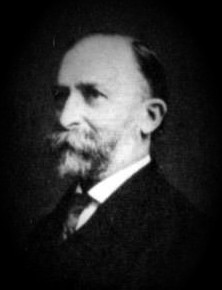 Kellogg took a much more pragmatic approach on behalf of the Seventh Day Adventist Church - all his 50 books included the use of eggs and dairy products. The famous Battle Creek Sanitarium, also making much use of hydrotherapy, used milk products as well, especially yogurt in the later years.
Kellogg took a much more pragmatic approach on behalf of the Seventh Day Adventist Church - all his 50 books included the use of eggs and dairy products. The famous Battle Creek Sanitarium, also making much use of hydrotherapy, used milk products as well, especially yogurt in the later years.
But privately Kellogg had abandoned them, spending about 40 years as a 'dietary vegan'. However his main biographer says that by 1917 he had gradually gone back to using milk products, again yogurt in particular. Then we are told he discovered soy milk.
Kellogg was in his 70s by then but made good use of it, probably replacing cow's milk to an increasing extent. Had he known about soy 50 years earlier our vegetarian history might have been different as Kellogg was undoubtedly a major influence - cornflakes with soy milk could have been the norm from the outset...
 Rupert Wheldon
Rupert Wheldon
In 1910 we have the first British 'vegan' cookbook: "No Animal Food and Nutrition and Diet with Vegetable Recipes", by Rupert Wheldon. The introduction included both medical and ethical reasons for the diet.
 Elmer Lee M.D.
Elmer Lee M.D.
Wheldon's book was soon re-published in New York by the Health Cutlure organization which inserted a few quotes, including: "Plant diet with butter, cream, milk, cheese, eggs, lard, fat, suet, or tallow added to it, is not vegetarian; it is mixed diet; the same in effect as if meat were used. --Elmer Lee, M.D., Editor, Health Culture Magazine."
Around the same time, November 6, 1910, the New York Times printed a report headlined: Dr. Lee pleads for better foods' which went into greater detail about his plant diet quoted above.
As well as ^plant diet' as above, that NYT report also contains our currently first known use of the phrase ^Plant-Foods' - this appears to be an American view of replacing the negative British 'no animal food' with a more positive view of the diet.
Notes:
There must have been some of this happening in Germany as well - if any German speaking historians can fill in the gaps it would be most welcome.
Russell Trail's 1874 vegan cookbook: www.archive.org/details/hygeianhomecookb00tral The New York edition of Rupert Wheldon's book: www.ivu.org/history/no-animal-food.pdfNew York Times 1910, on Elmer Lee: www.ivu.org/history/elmer-lee.pdf
 John Davis
John Davis
